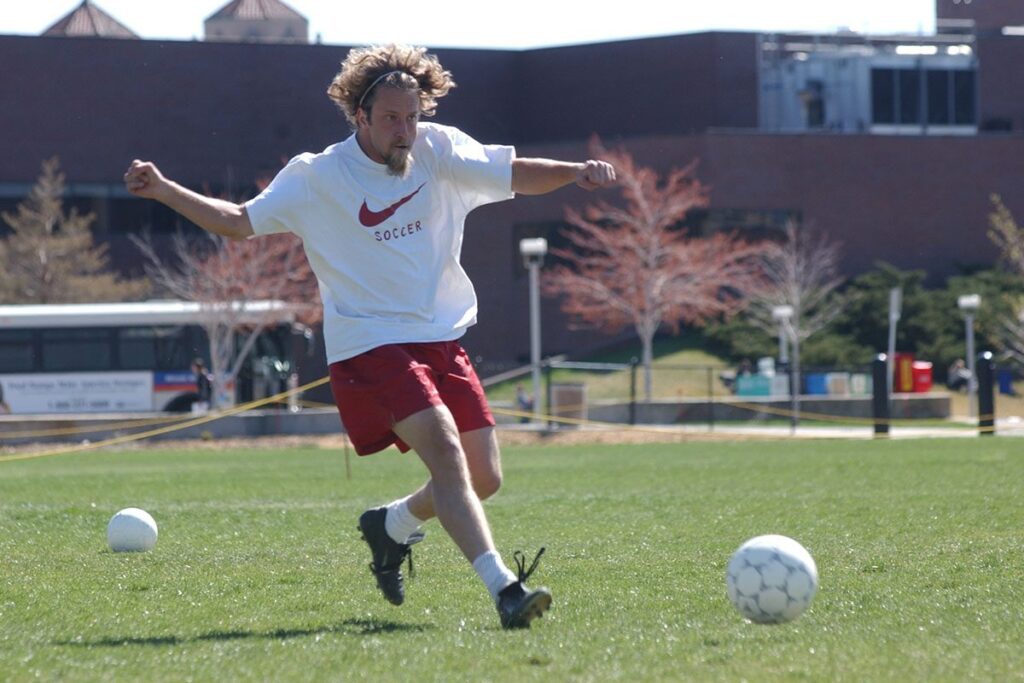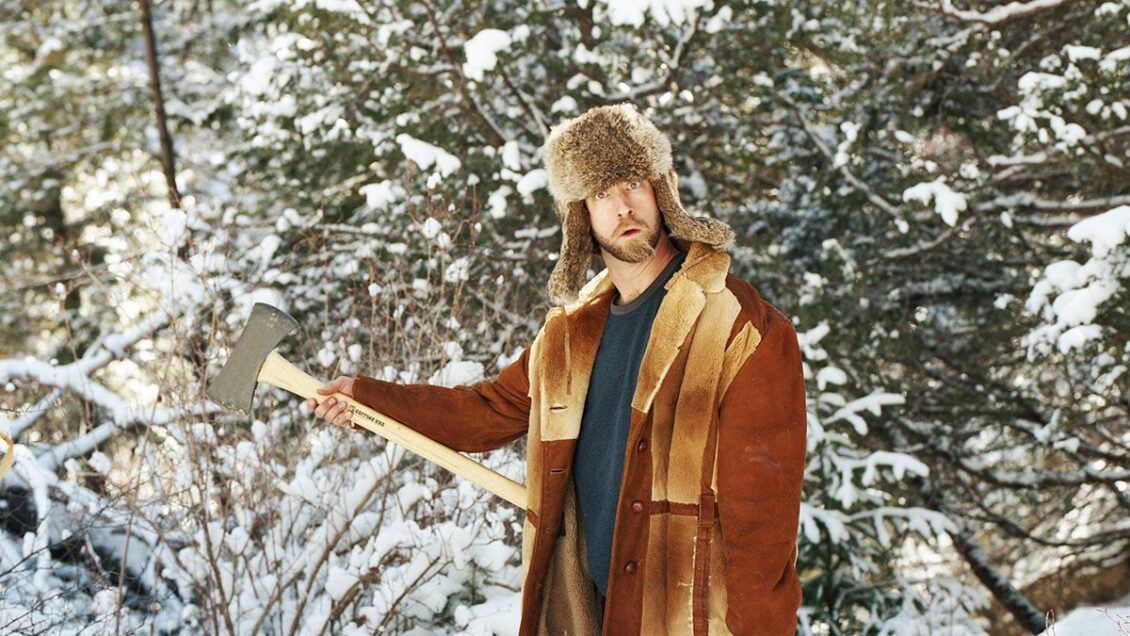He isn’t the cerebral palsy comic. No, Josh Blue is the comic who happens to have cerebral palsy.
Ahead of his visit to the Brooks Center for the Performing Arts Center this Thursday at 7:30 p.m., Blue participated in an interview with Clemson University’s Accessibility Commission to open up about his one-of-a-kind career in comedy.
This stop on “The Freak Accident Tour” is presented in partnership with the Brooks Center for the Performing Arts and the Clemson University Accessibility Commission. It is sponsored by the Clemson University Department of Access, Compliance and Education, the Clemson University Student Accessibility Services, the City of Clemson and the Clemson University Department of Parks, Recreation and Tourism Management.
Tickets are only $10 for adults and FREE for Clemson students. Tickets can be bought or reserved at the Brooks Center’s website, by phone at 864-656-7787, at the Brooks Center Box Office, or at the door. The Box Office is open Monday-Friday from 1-5 p.m. Students must use a Clemson University email address to reserve a ticket online and show a CUID upon arrival.
Blue’s interview with the Accessibility Commission and Clemson News has been edited for length and clarity.
Clemson News: What barriers did you encounter entering the comedy industry?
Josh Blue: “I started so early in my life in college. I was doing shows at the college I went to called Evergreen State College in Olympia, Washington. It’s a very liberal arts school and caters to alternative learning, and there’s no mandatory credit. If you aren’t good at math, you can focus on something you’re good at. You can create your own courses, and I studied stand-up comedy my senior year.
“I was the only guy on campus doing stand-up. The obstacle was not really knowing what standup even was or how it worked. Once I got into the real world and started trying to perform, it’s one of those things where I’d get to the venue and nobody gives me the time of day. Then, I’d go on, and everybody would be like, ‘Oh, it’s so nice to meet you.’ I’m just very fortunate that I’ve always had the gift of being funny.
“I definitely have run into a lot of people who see me, the way I walk or the way I move and they automatically think this guy can’t have anything that’s funny or of value. Then, I go knock their socks off, and the tune changes pretty quick.”
CN: Is that treatment difficult to process? How do you reconcile that?
JB: “I have to cast my memory back to those days because I come with a level of credit and accolades, and people know why they’re there to see me. At the time, it was definitely a challenge. It was like when you first start doing something. You don’t know what’s normal and what’s not normal. I was just trying to figure out what the path was.
“The one thing I will say that has come up in my career now is that for the longest time, people only saw me as the cerebral palsy comic. They didn’t see me as a comic that has cerebral palsy, so that was a big issue that I have. Some people in the industry still see me as the one-trick pony. If they think that, they’ve never been to my show.”
CN: What’s it been like trying to have the public focus on Josh, the comedian, versus Josh, the comedian with cerebral palsy?
JB: “That’s up to me and the material. I can make the palsy joke all day. But until I have other material about life that doesn’t have to do with it, then it’s hard to convince people I have other stuff. If you go back and watch my body of work (which can be found on Amazon and Netflix), you’ll see I’ve evolved as a comedian but also as an adult and parent. My perspective has changed on disability, what that is and how it’s best to educate people because I’m doing standup. I love standup. You always leave my show with a different understanding or perspective of what disability is.”
CN: Is there any advice you would give today’s aspiring comedians?
“Don’t bother; I got it covered (laughs). The advice I’ve always heard is — young comics don’t do this — is to immerse yourself in the lifestyle. If you want to be a comic, go to every show you can. In the grand scheme of things, being funny is the third thing on the list of what it takes to be a successful comic. You have to know how the business works, how to stay out of the way of the servers and who to talk to so you can grease the wheels.
“Knowing the etiquette of the actual comedy club is a big part of that. If you’re funny but don’t understand how the business works, you’ll never get anywhere. Go to the comedy club and get to as many shows as you can.”
CN: Can you share what it means to perform at Clemson University to you when you’ve been on national television and premier comedy venues?
JB: “I take every show and put it on an equal playing field. I don’t look at this show any differently than a comedy club or theater. If people are there that want to laugh, then I’m there to provide that. It could be in a barn for all I care as long as people want to enjoy and listen to what I have to say.”
CN: Do you have a favorite memory from childhood?
“That’s a pretty broad and hard question. I would definitely go back to when I was 15 and lived in Senegal in West Africa. I lived there for a whole year and my dad was a professor. It was the most influential part of my life in getting to see my place in the world, not just as a white person but as a disabled person. As someone who was — in high school, I had a lot of angst and worry about being disabled. I went to Africa and realized how lucky I was to have what I have.
“I believe that the best education is travel and seeing cultures of how people live their lives. You come back to America and realize what privileges you have and what you take for granted every day. Americans, I think, are very entitled. We don’t understand what we have going here.”
CN: Was your platform on “America’s Got Talent” helpful in educating audiences on disabilities?
JB: “I mean, it’s the world’s largest talent competition. It airs in America, but it also goes around the world in the weeks after. Each week, I’d get emails from Iran and places like Guam. It was cool to see my message being spread through the world. People would write, ‘Hey, thanks for putting yourself out there and letting us be proud of being disabled and not ashamed of it.’
“I always put humor first. If you take a message from that, then that’s on you. My first goal is never, ‘Oh, I’m going to educate these people.’ I’m just doing what I love to do. I’m a comic.”
CN: You were on the U.S. Soccer team in the 2004 Summer Paralympics held in Greece. How did that come to fruition?
JB: “It was another pivotal moment of my life. I had never been on a team before. I love soccer and grew up in a family where all my siblings played soccer. I tried out for my junior high team and they cut me. It was devastating, heartbreaking. Nobody should be cut from the team in junior high. All I’m going to do is get better. Right? Let me learn the game.

“I found out about the Paralympics after college. I met a Paralympian and she saw me kicking the ball and said there was a team for me. She gave me a coach’s email address on a gum wrapper, which I carried in my wallet for six months because I was terrified to take that step. I started having success in open mic competitions at bars, which gave me the courage to email the coach. I remember the email.
“I wrote, ‘My name is Josh Blue, I’m 22 years old, I have cerebral palsy and I’m a damn good soccer player.’ Sure enough, a week later, he wrote back, ‘Nice to meet you, Josh Blue. We’re always looking for damn good soccer players.’ A month later, I was on a plane to Washington, D.C., for tryouts. I was a starter or first sub for all eight years of being on the team. My comedy career and soccer fed off each other. Getting to hang out with other disabled people — palsy guys, stroke guys, brain injury guys — made me comfortable with being disabled and that’s where the jokes started coming, busting chops on the field and making everybody laugh.”
CN: Finally, who is on your Mount Rushmore of comedy?
JB: Mitch Hedberg, Chris Rock, Richard Pryor and George Carlin.
More on Josh Blue
After his groundbreaking win on Last Comic Standing in 2006, Josh Blue has risen through the ranks to become a well-established headliner at venues throughout the world. In 2018, Blue performed on “The Tonight Show Starring Jimmy Fallon.” The same year, he was honored with a performance at the William H. Macy Gala at the prestigious Just for Laughs Comedy Festival in Montreal. He wrapped up 2018 by recording his fifth hour-long special, “Broccoli,” at his home club, Comedy Works in Denver. In 2021, following his 3rd place finish on NBC’s “America’s Got Talent,” Blue hit the road with his “As NOT Seen on TV Tour.”
He does over 200 shows a year, continuing to spread laughter and break down stereotypes of people with disabilities. His routine is constantly evolving, and his off-the-cuff improvisational skills guarantee that no two shows are alike.
Blue represented the United States in eight countries as a member of the U.S. Paralympic Soccer Team. He is a single father living in Denver with his son and daughter.
Get in touch and we will connect you with the author or another expert.
Or email us at news@clemson.edu

